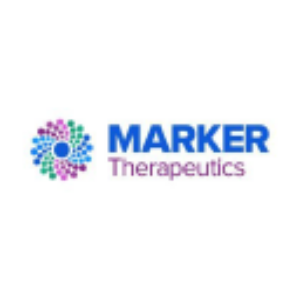Welcome to our dedicated page for Marker Therapeut news (Ticker: MRKR), a resource for investors and traders seeking the latest updates and insights on Marker Therapeut stock.
Marker Therapeutics Inc (MRKR) is a clinical-stage biotechnology company pioneering novel T cell-based immunotherapies and peptide vaccines for hematological cancers and solid tumors. This news hub provides investors and researchers with timely updates on MRKR's advancements in cancer treatment innovation.
Access comprehensive coverage of Marker Therapeutics' developments, including clinical trial progress, strategic partnerships, and regulatory milestones. Our curated news ensures you stay informed about key initiatives in immuno-oncology without promotional bias.
Key updates include MultiTAA technology advancements, NIH-funded research programs, financial disclosures, and scientific presentations. We track both therapeutic breakthroughs and operational developments critical for evaluating MRKR's position in the competitive biotech landscape.
Bookmark this page for streamlined access to verified Marker Therapeutics updates. For comprehensive analysis of MRKR's pipeline and market potential, visit Stock Titan regularly.
Marker Therapeutics (Nasdaq: MRKR) reported significant updates regarding its clinical programs and financial results for fiscal year 2022. The company received a $2 million grant from the FDA for the Phase 2 ARTEMIS trial of MT-401 in acute myeloid leukemia (AML) and cleared IND applications for MT-601 targeting metastatic pancreatic cancer and non-Hodgkin lymphoma. The improved T cell manufacturing process for MT-401 has yielded a production time reduction to 9 days and enhanced product efficacy. Financially, Marker reported a net loss of $29.9 million, down from $41.9 million in 2021, and had a cash position of $11.8 million at year-end.
Marker Therapeutics (Nasdaq: MRKR) announced a Common Stock Purchase Agreement with Lincoln Park Capital Fund for up to $25 million. This agreement allows Marker to sell shares at its discretion over a 24-month period, subject to the effectiveness of a registration statement with the SEC. The proceeds will support the Phase 2 ARTEMIS trial of its lead candidate, MT-401, and other clinical programs. CEO Peter Hoang emphasized the importance of this deal for flexible capital access post-restructuring.
Marker Therapeutics, Inc. (Nasdaq: MRKR) announced FDA clearance for its Investigational New Drug (IND) application for MT-601, a T cell product targeting six antigens for patients with advanced pancreatic cancer. The IND approval marks a significant milestone as the company prepares to initiate a Phase 1 clinical trial in 2023. The new manufacturing process for MT-601 allows production in 9 days with a 90% reduction in interventions, improving the final T cell product. The clinical trial follows encouraging results from the Phase 1 TACTOPS study conducted at Baylor College of Medicine.
Marker Therapeutics, Inc. (Nasdaq: MRKR) has been awarded a $2 million U.S. FDA Orphan Products Grant for its Phase 2 ARTEMIS trial of MT-401, targeting post-transplant AML patients. The company has successfully treated six patients using a new T cell manufacturing process, which enhances potency against tumor antigens. Financial results for Q3 2022 show a net loss of $6.9 million, an improvement from $12.4 million the previous year. Cash and equivalents stand at $18.1 million, with R&D expenses rising to $7.3 million. Marker aims to initiate further trials in 2023.
Marker Therapeutics has received a $2 million grant from the FDA's Orphan Products Grants program to support its Phase 2 ARTEMIS trial of the multi-antigen targeted T cell therapy, MT-401, in patients with post-transplant acute myeloid leukemia (AML). This grant will fund the evaluation of MT-401 in patients with minimal residual disease after stem cell transplant. The trial aims to assess relapse-free survival and treatment efficacy, with promising initial results suggesting potential benefits for patients facing limited treatment options.
Marker Therapeutics (Nasdaq: MRKR), a clinical-stage immuno-oncology company, announced that its President and CEO, Peter L. Hoang, will participate in a panel discussion titled, “CAR-T and Beyond: What Are the Next Generation Cell Therapies?” at the Cantor Fitzgerald Cell and Genetic Medicines Conference in New York on September 15, 2022 at 9:20 a.m. ET. This participation highlights the company’s focus on developing innovative T cell-based immunotherapies for treating hematological malignancies and solid tumors, showcasing their commitment to advancing cancer treatment.
Marker Therapeutics (MRKR) reported its Q2 2022 financial results and corporate updates, highlighting progress in its clinical programs for AML and lymphoma. The company received an $8 million upfront payment from Wilson Wolf, aiding its efforts. MT-401, a treatment for AML, continues to show promise with recent patient results. Additionally, the FDA cleared IND applications for MT-601 targeting lymphoma and pancreatic cancer. However, the company implemented a restructuring plan, reducing its workforce by 23.5% to conserve capital. As of June 30, 2022, cash reserves stood at $25.8 million.
Marker Therapeutics (Nasdaq: MRKR) has received FDA clearance for its IND application of MT-601, a novel T cell therapy targeting six tumor-associated antigens. The upcoming Phase 1 trial will focus on patients with relapsed/refractory non-Hodgkin lymphoma who have failed anti-CD19 CAR T therapies. The therapy aims to offer significant advantages, including enhanced durability and reduced severe toxicities compared to traditional CAR-T therapies. The trial highlights a manufacturing process enabling a higher cell dose, which could accelerate treatment timelines and improve patient outcomes.

